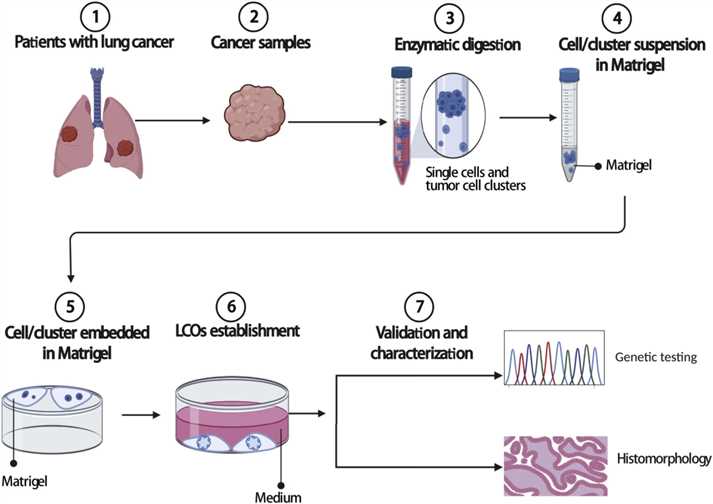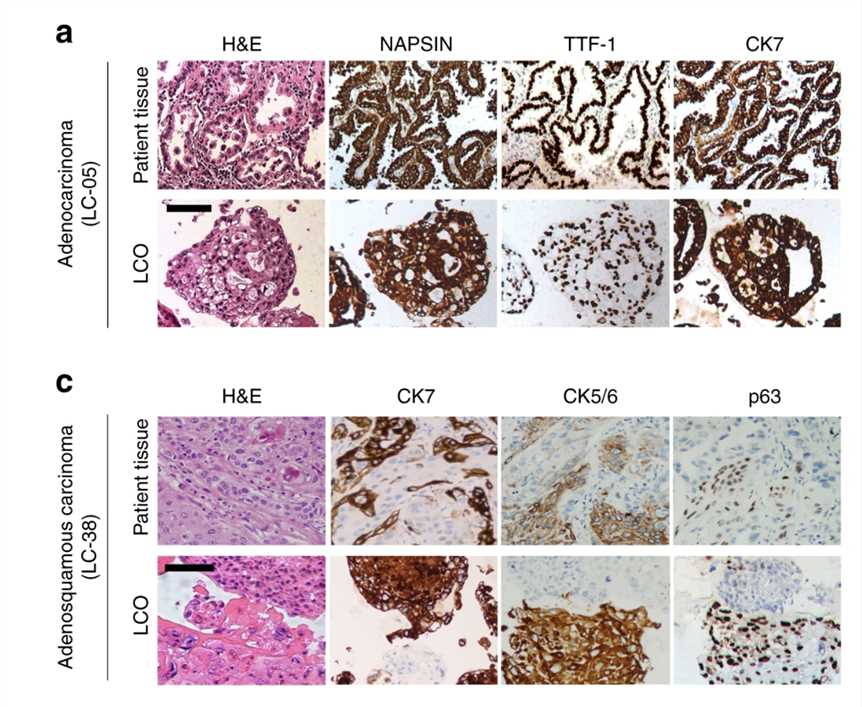All products and services are For Research Use Only and CANNOT be used in the treatment or diagnosis of disease.
Lung cancer is the most mortality human cancer around the world and shows great diversity in genetic and histological features among individual populations. Organoids have sprung up as the most proper 3D model to accurately recapitulate human tumor biology and facilitate the study of immuno-oncology. Creative Biolabs is a leading service provider in organoid technology and CAR-T development, and we provide an optimal culture system, especially for lung cancer organoid generation and maintenance. Furthermore, we offer a sufficient characterization of the established organoids compared with parental tumors.
 Fig.1 Illustrative cultivation steps for lung cancer organoid. (Ma, et al., 2022)
Fig.1 Illustrative cultivation steps for lung cancer organoid. (Ma, et al., 2022)
Lung cancer organoids can be established in three typical approaches, including:
The organoid of lung cancer can be characterized using versatile methods in 3 aspects, including histomorphology, tumor marker identification, and genetic alterations.
With extensive experience in CAR-T therapy development, Creative Biolabs provides lung cancer-targeted CAR-T-related products for in vitro anti-tumor efficacy tests. We also offer customized one-stop CAR-T development services for lung cancer studies.
| Target antigen | Target description | CAR-T Products |
| OR2H1 | OR2H1, an olfactory receptor, is expressed in multiple cancers but rarely expressed in normal tissues, which serves as a potential target for CAR-T therapies. | Anti-OR2H1 CAR-T |
| PSCA | PSCA, defined as prostate stem cell antigen, is overexpressed in multiple tumors, including prostate cancer and lung cancer. | Anti-PSCA CAR-T |
| Mesothelin | Mesothelin is a diagnostic target as well as an attractive target for immunotherapies. | Anti-Mesothelin CAR-T |
| EGFR | EGFR is one of the membrane proteins that has increased expression in lung cancer tissue. | Anti-EGFR CAR-T |
| MUC1 | The expression of MUC1(Mucin 1) is significantly elevated than normal tissue cells and promotes tumor metastasis. | Anti-MUC1 CAR-T |
| CEA | CEA has an aberrant expression in lung cancer tissues and is an indicator of poor survival. | Anti-CEA CAR-T |
| Lung Cancer Organoids Derived from Patient Tumor Tissue | |
| Key Findings |
|
| Representative Results |
 Fig.2 Lung cancer organoids retain the histological characteristics of separate initial tumor tissue validated by H&E staining and IHC analysis. (Kim, et al., 2019) |
Experienced experts at Creative Biolabs offer premium quality organoids for the evaluation of CAR-T efficacy. We promise high quality and efficiency. Please contact us and get more detailed information.
References
For any technical issues or product/service related questions, please leave your information below. Our team will contact you soon.
 NEWSLETTER
NEWSLETTER
The latest newsletter to introduce the latest breaking information, our site updates, field and other scientific news, important events, and insights from industry leaders
LEARN MORE NEWSLETTER NEW SOLUTION
NEW SOLUTION
CellRapeutics™ In Vivo Cell Engineering: One-stop in vivo T/B/NK cell and macrophage engineering services covering vectors construction to function verification.
LEARN MORE SOLUTION NOVEL TECHNOLOGY
NOVEL TECHNOLOGY
Silence™ CAR-T Cell: A novel platform to enhance CAR-T cell immunotherapy by combining RNAi technology to suppress genes that may impede CAR functionality.
LEARN MORE NOVEL TECHNOLOGY NEW SOLUTION
NEW SOLUTION
Canine CAR-T Therapy Development: From early target discovery, CAR design and construction, cell culture, and transfection, to in vitro and in vivo function validation.
LEARN MORE SOLUTION